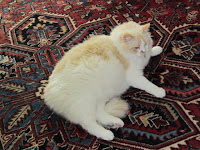 |
| Barclay on Heriz |
So today I bring you How to Remove Chocolate Stains Pat II: Other surfaces! As always I welcome any recommendations that you've found successful. Thanks to HowStuffWorks.com and Hints from Heloise for these suggestions.
Carpet (Synthetic or Wool):
Two possible treatments. Choose only one. Remember to get to the stains as quickly as possible.
I. Scrape off as much chocolate residue as you can.
Then, with a white paper towel or clean cloth, apply dry-cleaning fluid to the stain and blot.
If any stain remains, apply a solution of 1/4 teaspoon mild white detergent and 1 cup room-temperature water. Work from the outer edge of the stain to the middle -- always blotting, not rubbing.
Rinse with clear water to remove soap residue.
II. Blot up or scrape as much of excess as possible.
To prevent setting stain, flush with club soda.
Try an application of Spot Shot Carpet Stain Remover or a concentrated solution of a non-alkali carpet shampoo.
After drying and vacuuming, if stain remains:
Mix 1 tablespoon ammonia to 1 cup water and carefully drop small amounts onto the stain. (On wool carpets, test in an inconspicuous corner first, as ammonia can harm wool.)
Blot with an absorbent pad.
Flush area rugs or sponge carpeting with clear water. It is important to remove all traces of ammonia.
Place a clean absorbent pad over the area and weight it down.
When no more liquid is being absorbed, allow it to thoroughly air dry.
Alabaster and Marble
Carefully scrape excess.
Wipe with a clean cloth dipped in a solution of washing soda or detergent and water.
Rinse well and wipe dry.
If any stain remains:
Mix a few drops of ammonia with 1 cup of 3% hydrogen peroxide.
Soak a white blotter with the solution and place it over the stain.
Weight it down with a heavy object.
Continue applying the solution until the oil has been drawn out and any remaining stain bleached out.
Stone Surfaces
Granite, Brick, Concrete, Flagstone, Limestone, Masonry Tile, Sandstone, Slate, Terrazzo
Scrape to remove excess, taking care not to gouge the surface.
Wash with a solution of washing soda or detergent (never use soap) and water.
Use a cloth or a gentle brush.
Rinse thoroughly with clear water and allow to dry.
Wood
Mix dishwashing detergent in hot water and swish to make a great volume of suds.
Dip a cloth in only the foam and apply.
Rinse with a clean cloth dampened with clear water.
Polish or wax as usual.
Grout
Wipe excess with a cloth dipped in warm sudsy water.
If any stain remains:
Dip a wet toothbrush into baking soda or powdered cleanser.
Gently scrub the spot.
Rinse well and wipe dry.
Silver
Wash silver in hot sudsy water.
Rinse thoroughly in hot water.
Wipe dry immediately with a clean soft cloth to prevent tarnish.
No comments:
Post a Comment